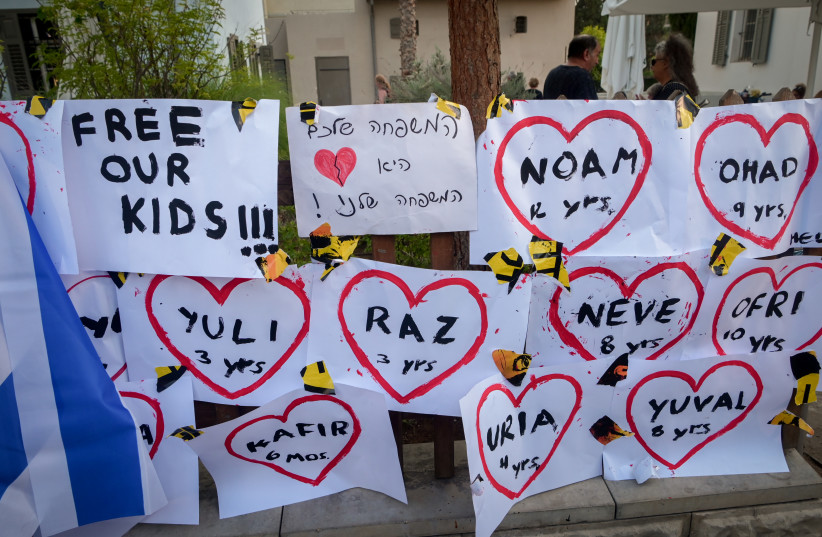It seems unthinkable.
When Israel started its counteroffensive against Hamas in early October, the two goals were to “annihilate” Hamas and to return “all” of the hostages.
And yet, is it possible that the IDF may try to declare “victory” with a sizable number of hostages (currently ranging between 130-140 depending on the latest intelligence) still in Hamas’s hands, and the terror group’s top leaders, Yahya Sinwar and Muhammad Deif, at large?
What would such a stunning scenario look like?
Ending the war before reaching objectives
First of all, there were those who even early on said that Israel would fall short of annihilating Hamas either because of a lack of will, because of the hostages, or because of global pressure for a ceasefire.
However, these observers believed that Israel might not even implement a deep invasion of northern Gaza, or might only invade northern Gaza, but leave southern Gaza untouched.
The scenario that may be floating around now does not match those predictions of Israeli meekness anymore than it does the annihilation of Hamas and return of all hostages scenario.

Rather, the IDF may take complete control of 95-99% of Gaza, including the north, the south, and the center (which to date has been mostly overlooked), while leaving a large segment of the hostages and Sinwar and Deif (with the two issues likely being linked) at large.
At that point, sometime in mid or late January, the IDF may seek to wear down Sinwar and Deif over time into some kind of deal for the hostages, at the same time that it is at the "easier" putting down a low-grade insurgency stage.
An increasing number of top defense officials are talking about aspects of the resolution of the First Lebanon War as a model: a mix of security zones and a negotiated expulsion of the leaders of Hamas (Israel created a southern Lebanon security zone and expelled Yasir Arafat.)
Eventually, the Lebanon security zone was viewed as a failure that Israel could not properly defend and led to large numbers of dead Israeli soldiers over two decades.
But “large” numbers of dead has new meaning after Israel lost around 1,200 mostly civilians on October 7.
The longest Israel has gone without a major conflict with the Palestinians since the Second Intifada was a few years at a time (if you take into account all of the rounds of conflicts with rockets, the 2015-2016 Knife Intifada, the 2018 border riots), such that if Israel got two decades without any attacks on its home front from Gaza, it might tolerate losses of soldiers in a new security zone.
Expelling Arafat did not end him as a threat, but it did reduce the severity of the danger he presented.
Of course, Hamas is not Arafat.
Its ideology is far more fanatical and the commitment of its followers to Israel’s destruction, as opposed to a general nationalist battle over land, is much more vicious.
So Sinwar and Deif may not accept any offer and Israel may just delay the painful decision of getting them versus returning more hostages.
But what is dizzying about this whole new scenario is that Israel may start the “cleaning up the insurgency” stage, expected to last three to nine months, while it is still dealing with Sinwar/Deif/the hostages.
What impact would this strange mix have on the long-term picture?
It is possible that as long as Sinwar/Deif/the hostages are in play, that the insurgency will be much stronger.
Those who seek to expel Israel from Gaza may feel that the IDF has failed to win, so getting Israel to leave will be easier.
This is a threat that must be considered if Israeli leaders are considering letting the Sinwar/Deif/hostages process drag out beyond the end of the “main war.”
A month ago, some top IDF officials said that they might be able to end the main war more quickly by a special forces assassination of Hamas’s top leaders. That should tell the IDF that leaving them in play and in control of hostages could be as big a shot in the arm for the terror group, as removing them could be a way to speed up the Gaza organization’s downfall.
There are also still questions about who Israel will hand over Gaza to.
Who will Israel hand Gaza over to?
Will any Gazans or any Arab countries or the Palestinian Authority be ready to risk their lives and reputation to take over Gaza when they all know that Sinwar and Deif are still a potential decisive factor? Will they want to take over a territory when there could still be an additional major Israeli operation to end the Hamas leaders at a later date or to free the hostages?
Kicking the can down the road can sometimes allow time to more easily resolve problems.
Doubtless the hope would be that time would take its toll on Sinwar and Deif and the inevitability of their defeat would make them more flexible.
But sometimes kicking the can down the road on a fundamental hard decision just means dealing with the same Catch-22 at another time with another set of impossible factors and choices at stake.
